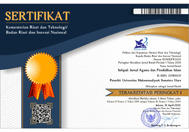Evaluasi Program Terapi Al-Quran Melalui Model Context, Input, Process, Product (CIPP)
Abstract
Keywords
Full Text:
PDFReferences
Andriyani, J. (2013). Psikoterapi Religius sebagai Strategi Peningkatan Motivasi Hidup Usia Lanjut. Jurnal Al-Bayan, 19(28), 31-42.
Astri Lestari (2019). Terapi Al-Quran bagi Anak Autisme di Sekolah Khusus Taruna Al-Quran Ngaglik, Sleman, Yogyakarta. Skripsi, tidak dipublikasikan. Universitas Islam Negeri Syarif Hidayatullah.
Darodjat, & M, W. (2015). Model Evaluasi Program Pendidikan. Islamadina, 14(1), 1-28.
Duwi Puji Astuti (2018). Evaluasi Pelaksanaan Program Tahfidzul Quran di SDIT Permata Bunda Mranggen Demak (Ditinjau dari Context, Input, Process, dan Product). Skripsi, tidak dipublikasikan. Universitas Islam Negeri Walisongo.
Fadilah, R., & Madjid, A. (2020). Patience Therapy to Reduce Adolescents' Anxiety Assessed from Personality and Parenting. IJIEP: International Journal of Islamic Educational Psychology, 1(1), 1-11.
Haerullah, H. (2020). Dimensi Pendidikan Formal dan Non Formal. Jurnal Edukasi Nonformal, 1(2), 190-207.
Istiyani, N. M., & Utsman. (2019). Evaluasi Program Model CIPP pada Pelatihan Menjahit di LKP Kartika Bawen. Jurnal Pendidikan Luar Sekolah, 3(2), 6-13.
Julianto, V., Dzulqaidah, R. P., & Salsabila, S. N. (2014). Pengaruh Mendengarkan Murattal Al Quran terhadap Peningkatan Kemampuan Konsentrasi. Psympathic: Jurnal Ilmiah Psikologi,1(2), 120-129.
Khilmiyah, A. (2016). Metode Penelitian Kualitatif. Yogyakarta: Samudra Biru.
Kusmawati, A. (2017). Tahsin Method of Al-Quran and Parenting for Children Hyperactive in Kindergarten School Orange, Ciputat Timur, Tangerang Selatan, Indonesia. Advances in Social Science, Education and Humanities Research (ASSEHR): Volume 58. 3rd International Conference on Early Childhood Education (ICECE-16) (pp. 97-104). Bandung: Atlantis Press.
Lahmuddin. (2012). Psikoterapi dalam Perspektif Bimbingan Konseling Islami. Miqot, 36(2), 388-408.
Madjid, A. (2018). Analisis Kebijakan Pendidikan. Yogyakarta: Penerbit Samudra Biru.
Mahmudi, I. (2011). CIPP: Suatu Model Evaluasi Program Pendidikan. Jurnal At-Ta'dib, 6(1), 111-125.
Mar'ati, R. (2016). Pengaruh Pembacaan dan Pemaknaan Ayat-ayat al-Quran terhadap Penurunan Kecemasan pada Santriwati. PSIKOHUMANIORA: Jurnal Penelitian Psikologi, 1(1), 30-48.
Niken Masruroh (2016). Evaluasi Program Tahfiz Al-Quran di SMP Al Irsyad Al Islamiyyah Purwokerto. Skripsi, tidak dipublikasikan. Institut Agama Islam Negeri Purwokerto.
Nur Fazlinawati (2017). Resepsi Ayat Al-Qur'an dalam Terapi Al-Qur'an (Studi Living Qur'an di Sekolah Khusus Taruna al-Qur'an Jongkang, Sariharjo, Ngaglik, Sleman, Yogyakarta). Skripsi, tidak dipublikasikan. Universitas Islam Negeri Sunan Kalijaga.
Mubasyaroh. (2017). Pendekatan Psikoterapi Islam dan Konseling Sufistik dalam Menangani Masalah Kejiwaan. Konseling Religi: Jurnal Bimbingan Konseling Islam, 8(1), 193-210.
Mufidah, L. I. (2015). Pentingnya Psikoterapi Agama Dalam Kehidupan di Era Modern. Jurnal Lentera: Kajian Keagamaan, Keilmuan dan Teknologi, 1(2), 181-196.
Muryadi, A. D. (2017). Model Evaluasi Program dalam Penelitian Evaluasi. Jurnal Ilmiah PENJAS, 3(1), 1-16.
Nugraheni, D., Mabruri, M. I., & Stanislaus, S. (2018). Efektivitas Membaca Al-Quran untuk Menurunkan Stres Akademik Pada Siswa Kelas XI SrefitMA Negeri 1 Kebumen. Intuisi: Jurnal Psikologi Ilmiah, 10(1), 59-71.
Oktora, S. P., Purnawan, I., & Achiriyati, D. (2016). Pengaruh Terapi Murottal Al Quran terhadap Kualitas Tidur Lansia di Unit Rehabilitasi Sosial Dewanata Cilacap. Jurnal Keperawatan Soedirman (The Soedirman Journal of Nursing), 11(3), 168-173.
Rahmayani, M. P., Rohmatin, E., & Wulandara, Q. (2018). Pengaruh Terapi Murottal Al-Quran terhadap Tingkat Stres pada Pasien Abortus di RSUD dr. Soekardjo Kota Tasikmalaya Tahun 2018. Jurnal Bidan Midwife Journal, 4(2), 36-41.
Refita, Y., Siregar, H., & Suroso, A. I. (2017). Evaluasi Program Sarjana Membangun Desa (SMD) dan Strategi Pengembangannya (Studi Kasus Provinsi Sumatera Barat, Jawa Barat, dan Nusa Tenggara Barat). Journal of Regional and Rural Development Planning, 1(1), 98-113.
Riana, I. A., Juliana, I. D., & Kurniawan, K. U. (2015). Evaluasi Program Sekolah terhadap Pelaksanaan KTSP pada Aspek Konteks, Input, Proses, Output, dan Outcome. Singaraja: Universitas Pendidikan Ganesha.
Roshinah, F., Nursaliha, L., & Amri, S. (2014). Pengaruh Terapi Murottal Terhadap Tingkat Hiperaktif Impulsif pada Anak Attention Deficit Hyperactivity Disorder (ADHD). PELITA, 9(2), 141-145.
Sugiyono. (2019). Metode Penelitian Kuantitatif, Kualitatif, dan R&D. Bandung: Alfabeta.
DOI: https://doi.org/10.30596/intiqad.v13i1.6634
Refbacks
- There are currently no refbacks.
Intiqad Jurnal Agama dan Pendidikan Islam is abstracting & indexing in the following databases:
View My StatsEditorial Address:
Faculty of Islamic Religion, Universitas Muhammadiyah Sumatera Utara. Jl. Mukhtar Basri No. 3 Medan 20238 Telp. (061) 6622400 ext. 27 dan 28 Fax. (061) 6625474. e-mail: intiqad@umsu.ac.id

























